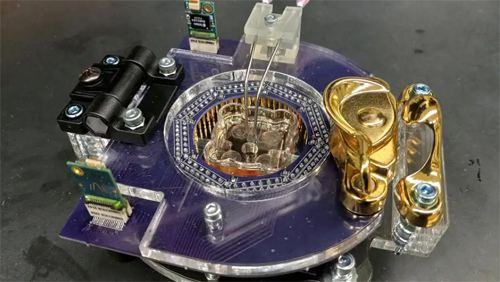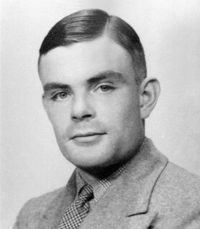
Your complimentary articles
You’ve read one of your four complimentary articles for this month.
You can read four articles free per month. To have complete access to the thousands of philosophy articles on this site, please
News
News: April/May 2023
Computer made of mouse brain cells • Microsoft disbands AI ethics team • RIP Ernst Tugendhat — News reports by Anja Steinbauer
Welcome to a New Epoch!
Plastic pollution is changing our planet, in a real geological sense. On Trinidade Island, a remote Brazilian marine reserve, geologists have discovered a new type of igneous rock formed mainly from plastic from old fishing nets. This is different from the sedimentary plastic rocks called plastiglomerates previously reported in various parts of the world: pebbles, sand and other debris fused together with plastic melted by bonfires. Fernanda Avelar Santos, a geologist at the Federal University of Paraná in Brazil called it “new and terrifying at the same time, because pollution has reached geology.” “The pollution,” explains Santos, “the garbage in the sea and the plastic dumped incorrectly in the oceans is becoming geological material … preserved in the Earth’s geological record.” According to some experts this means a new geological epoch has begun: the Anthropocene Epoch (from anthropos, the Greek word for ‘human’). Until now we have been living in what geologists call the Holocene Epoch, which began 11,500 years ago at the end of the last Ice Age.
AI Without Ethics?
Artificial Intelligence is booming. Microsoft is currently integrating text-generating AI into a large number of its products, including Teams, Word and Skype. However, this process will now happen without the support of a vital team. Microsoft’s Ethics and Society Team was recently dissolved as part of a large scale lay-off of employees. Though Microsoft retains its Office of Responsible AI, the Ethics and Society team played a vital role in ensuring that AI functions complied with ethical standards. An ex-employee explains: “People would look at the principles coming out of the Office of Responsible AI and say, ‘I don’t know how this applies…’ Our job was to show them and to create rules in areas where there were none.”
Ernst Tugendhat
The philosopher Ernst Tugendhat has died at the age of 93. Born in 1930 into one of the richest families in Czechoslovakia, Tugendhat grew up in a modernist mansion built by Mies van der Rohe, now a museum. Sadly, the family spent only eight years in that house before they had to leave to escape the persecution of Jewish citizens following the Nazi invasion. They moved to the US, then South America. At the age of 16, his mother gave him a copy of Martin Heidegger’s book Being and Time. Tugendhat was blown away. Later, having completed a degree at Stanford, Tugendhat moved to Germany to attend Heidegger’s lectures. Although he remained fascinated and “very impressed”, over the course of the following years Tugendhat demolished Heidegger’s ideas in various theses and publications until nothing was left. Holding professorships in Münster, in Heidelberg and later in Berlin and working with his friend Jürgen Habermas at the Max-Planck-Institut in Starnberg, Tugendhat has been a major influence on German philosophy. His published lectures on analytical philosophy as well as on ethics became required reading for philosophy undergraduates. In his own thinking he frequently returned to Plato’s Republic. Ultimately he came to disagree totally with Heidegger: philosophy, he concluded, is not about modes of being but about the meaning of life.
AI using Living Brain Cells
It is an idea that has featured in science fiction, but has now taken a first step towards becoming reality: a computer made of living cells. For some time, AI algorithms called neural networks, inspired by the architecture of the human brain, have been run on conventional computers. They have proved themselves useful in a wide range of applications. Researchers at the University of Illinois Urbana-Champaign, wondered whether it would be possible to run a neural net on a computer made of interconnected mouse brain cells. Andrew Dou and his colleagues recently announced that they had succeeded, and at an American Institute of Physics meeting they displayed a compact computer made of 80,000 mouse brain cells kept alive in an incubator. They trained the mousebrain-computer by repeatedly flashing ten different patterns of electrical pulses, then after it had rested for 30 minutes they analysed signals sent by the neurons to demonstrate that it anticipated the next pattern in the sequence. A future possibility mentioned is to use a brain cell computer to control a robot that moves by contractions of muscle cells. (Such a robot was reported in a paper by the same team in the journal Science Robot in January 2023).

Mouse braincell computer (University of Illinois U-C)
In Star Trek Voyager, the TV series that ran from 1995 to 2001, the starship’s main computer is based on gel packs of neural cells. While good at navigating through hyperspace, they prove susceptible to infections. Let’s hope the Illinois mouse computers don’t suffer the same fate.
Alan Turing – the Opera!

Alan Turing in 1951 (photo by Elliot & Fry Studio)
This issue contains a great deal about Alan Turing, the British code breaker and computer pioneer who died in 1954 – probably by suicide, eating an apple he had injected with poison. Turing’s increasing prominence in mainstream culture is confirmed by another development: an opera about his life is opening at the Chicago Opera Theater. The work has been under development for ten years by composer Justine F. Chen and librettist David Simpatico. In an interview, Chen said “I didn’t really know anything about Turing at that time. It was 2012, and Turing wasn’t as well-known as he is now. But David told me about him: that he was a war hero, brilliant, the father of computer science, a mathematician, and chemically castrated by his own country for being homosexual, and then he commits suicide: that sounded like an opera.” The opera, which is based on seven significant moments from different periods in Turing’s life, will be staged on March 23rd and 25th 2023.









